Talk Outline for Week 1:
How to Listen to God in Our Hearts
Below is the outline for Talk 2, titled “How to Listen to God in Our Hearts.” As you listen to the teaching video, follow along in this outline. You may print this outline and use the space to the right for notes or use your own journal for notetaking.
This teaching video contains many quotations from Scripture, the Catechism of the Catholic Church (CCC), and the lives of saints. There is a complete list of quotations at the end of this talk outline for reference.
Discussion questions follow the quotations. If you are participating in this series together with a group, consider selecting some or all of these questions for your group discussion.
Talk Outline
I. Basic principles of prayer – Six essential truths that guide our prayer life.
A. God, the Blessed Trinity, dwells within us by virtue of our baptism and desires a loving relationship with us (John 14:23).
- Prayer is a response to God’s loving pursuit of us. It is fundamentally about receiving his love and his call to live as his disciples (1 John 4:9-10; CCC ¶2560).
- We are fallen creatures, affected by original sin, and we have to continually repent in order to grow in faith, hope and love (1 John 1:8, CCC ¶1427, ¶1426).
- Personal subjective experiences are always governed by the objective spiritual authority of the Scripture and the Church’s living Tradition as spoken through the Magisterium (CCC ¶890; 2 Tim 3:16-17).
- God desires to be with us and show us his love in all the circumstances of life, because he always wants to bring good out of evil (2 Cor 1:3-4).
- “We know that all things work for good for those who love God, who are called according to his purpose.” (Rom 8:28)
- True discipleship depends upon a desire to seek after and do the will of God (Mt 7:24-27).
II. Where does prayer happen? It happens in our heart.
- When scripture speaks about the place where we encounter God, scripture speaks about the heart (Romans 5:5; 1 Sam 16:7; Ezekiel 36:26).
- “… According to Scripture, it is the heart that prays.” (CCC ¶2562)
- The heart is our center, the place of decision, the place of encounter, my deepest self. It is the place of love, of self-gift (CCC ¶2563).
III.God speaks to us by moving our hearts. A movement of the heart is called an affective movement.
- What is the “affect” – it is the center of our heart where we are moved.
- We are complex people and we have many different types of “interior movements.”
- We can be moved in our intellect, by coming to understand a truth.
- We can be moved in our passions, by anger or fear.
- We can be moved in our desires, both physical, emotional and even spiritual.
- Thoughts, feelings, and desires – these can all be movements of the heart that involve the emotions but are in fact deeper.
- St. Ignatius, in line with the spiritual tradition, makes clear that the main way that God speaks to us is through these “interior movements” which are “caused in the soul.” (Rule 4, Spir. Exer. #315.)
- Affective movements can be positive. When trying to follow God, St. Ignatius says: “It is proper to the good spirit to give courage and strength, consolation, tears, inspirations and quiet, easing and taking away of all obstacles, so that the person may go forward in doing good.” (Rule 2, Spir. Exer. #315.) God gives movements in our hearts in prayer that make it easier for us to follow him.
- Affective movements can also be negative. When trying to follow God, St. Ignatius says: “It is proper to the evil spirit to bite, sadden, and place obstacles, disquieting with false reasons, so that the person may not go forward.” (Rule 2, Spir. Exer. #315.) (Week 4 will discuss discernment of spirits; which movements are from God and which are not.)
- Examples of affective movements that might come up in prayer.
- Thoughts – for example, God is bigger than this problem; God sees me and knows me.
- Feelings – for example, a sense of warmth or of peace.
- Desires – for example, I want to be with you Lord; I need you; I want to trust you.
IV.Our Lord says, “Blessed are the pure of heart, for they will see God.” (Mt. 5:8)
- Through prayer, God desires to purify and cleanse our hearts so that we can learn to love him above all things and desire to serve him in our neighbor.
V. Because of my fallen nature I don’t always react the way I should.
- All of us have to some degree a disordered affect. The thoughts, feelings, and desires that arise in my heart naturally are not the same as the thoughts, feelings, and desires in the heart of Jesus which was completely pure. This is what gives rise to sin in me.
- “For I do not do the good I want, but I do the evil I do not want.” (Rom. 7:19)
VI. One of the goals of prayer is to heal my affect. To order it more and more, so I not only know the truth, but I am able to do it.
- Prayer is the way I grow in love of God. And the more I grow in love, the more it begins to order all the other feelings of my heart. St. Thomas Aquinas says: “love orders all the affections.”
- Prayer gradually heals our affect and allows us to not choose sin, but able to choose God through his grace.
- An ordered affect is when my affect corresponds to what is true, good,and beautiful.
- The goal is not to be a person with no feelings – but ordered feelings. Jesus had feelings, but they were ordered.
- St. John Paul II wrote about this in his Theology of the Body. True freedom is to be able to do what is right in love. A person with a pure heart can see the good and choose it.
- “Love is patient, love is kind. It is not jealous, [love] is not pompous, it is not inflated, it is not rude, it does not seek its own interests, it is not quick-tempered, it does not brood over injury, it does not rejoice over wrongdoing but rejoices with the truth.” (1 Cor. 13:4-6)
- Spending time with the love of Jesus and receiving his love in prayer allows my affect to be healed so I can learn to love the way he does.
- St. John of the Cross: To be truly free I have to be free from attachments, where I love something or someone more than I love God.
- Through prayer, the Lord frees me from those attachments and gradually he begins to bring purity of heart.
- “Meditation is a prayerful quest engaging thought, imagination, emotion, and desire. Its goal is to make our own faith the subject considered, by confronting it with the reality of our own life.” (CCC ¶2723)
- St. Francis de Sales; Introduction to the Devout Life.
- When we enter into this prayer of the heart, when we encounter the Lord in our hearts, it fills our hearts with the Lord, and gradually pushes out those things not of the Lord and purifies our hearts, and sets us free to love and serve him as his disciples.
WEEK 2: QUOTATIONS FROM THE TEACHING VIDEO
1. John 14:23 – “Jesus answered and said to him, ‘Whoever loves me will keep my word, and my Father will love him, and we will come to him and make our dwelling with him.’”
2. 1 John 4:9 – “In this way the love of God was revealed to us: God sent his only Son into the world so that we might have life through him.”
3. CCC ¶2560 – “’If you knew the gift of God!’ The wonder of prayer is revealed beside the well where we come seeking water: there, Christ comes to meet every human being. It is he who first seeks us and asks us for a drink. Jesus thirsts; his asking arises from the depths of God’s desire for us. Whether we realize it or not, prayer is the encounter of God’s thirst with ours. God thirsts that we may thirst for him.”
4. 1 John 1:8 – “If we say, ‘We are without sin,’ we deceive ourselves, and the truth is not in us.”
5. CCC ¶1427 – “Jesus calls to conversion. This call is an essential part of the proclamation of the kingdom:
‘The time is fulfilled, and the kingdom of God is at hand; repent, and believe in the gospel.’ In the Church’s preaching this call is addressed first to those who do not yet know Christ and his Gospel. Also,
Baptism is the principle place for the first and fundamental conversion. It is by faith in the Gospel and by Baptism that one renounces evil and gains salvation, that is, forgiveness of all sins and the gift of new life.”
6. CCC ¶1426 – “… the new life received in Christian initiation has not abolished the frailty and weakness of human nature, nor the inclination to sin that tradition calls concupiscence, which remains in the baptized such that with the help of the grace of Christ they may prove themselves in the struggle of Christian life. This is the struggle of conversion directed toward holiness and eternal life to which the Lord never ceases to call us.”
7. CCC ¶890 – “The mission of the Magisterium is linked to the definitive nature of the covenant established by God with his people in Christ. It is this Magisterium’s task to preserve God’s people from deviations and defections and to guarantee them the objective possibility of professing the true faith without error. Thus, the pastoral duty of the Magisterium is aimed at seeing to it that the People of God abides in the truth that liberates. To fulfill this service, Christ endowed the Church’s shepherds with the charism of
infallibility in matters of faith and morals.”
8. 2 Timothy 3:16-17 – “All scripture is inspired by God and is useful for teaching, for refutation, for correction, and for training in righteousness, so that one who belongs to God may be competent,
equipped for every good work.”
9. 2 Corinthians 1:3-4 – “Blessed be the God and Father of our Lord Jesus Christ, the Father of compassion
and God of all encouragement, who encourages us in our every affliction, so that we may be able to
encourage those who are in any affliction with the encouragement with which we ourselves are
encouraged by God.”
10. Romans 8:28 – “We know that all things work for good for those who love God, who are called according to his purpose.”
11. Matthew 7:24-27 – “Everyone who listens to these words of mine and acts on them will be like a wise man who built his house on rock. The rain fell, the floods came, and the winds blew and buffeted the house. But it did not collapse; it had been set solidly on rock. And everyone who listens to these words of mine but does not act on them will be like a fool who built his house on sand. The fain fell, the floods came, and the winds blew and buffeted the house. And it collapsed and was completely ruined.”
12. Romans 5:5 – “… hope does not disappoint, because the love of God has been poured into our hearts through the holy Spirit that has been given to us.”
13. 1 Samuel 16:7 – “But the Lord said to Samuel: Do not judge from his appearance or from his lofty stature, because I have rejected him. God does not see as a mortal, who sees the appearance. The Lord looks into the heart.”
14. Ezekiel 36:26 – “I will give you a new heart, and a new spirit I will put within you. I will remove the heart of stone from your flesh and give you a heart of flesh.”
15. CCC ¶2562 – “Where does prayer come from? Whether prayer is expressed in words or gestures, it is the whole man who prays. But in naming the source of prayer, Scripture speaks sometimes of the soul or the spirit, but most often of the heart (more than a thousand times). According to Scripture, it is the heart that prays. If our heart is far from God, the words of prayer are in vain.”
16. CCC ¶2563 – “The heart is the dwelling-place where I am, where I live; according to the Semitic or Biblical expression, the heart is the place ‘to which I withdraw.’ The heart is our hidden center, beyond the grasp of our reason and of others; only the Spirit of God can fathom the human heart and know it fully. The heart is the place of decision, deeper than our psychic drives. It is the place of truth, where we choose life or death. It is the place of encounter, because as image of God we live in relation: it is the place of covenant.”
17. Pope Benedict XVI, Jesus of Nazareth, Vol. 1., 92-93 – “The organ for seeing God is the heart. The intellect alone is not enough. In order for man to become capable of perceiving God, the energies of his
existence have to work in harmony. His will must be pure and so too must the underlying affective dimension of his soul, which gives intelligence and will its direction.”
18. Romans 7:18-25 – “For I know that good does not dwell in me, that is, in my flesh. The willing is ready at hand, but doing the good is not. For I do not do the good I want, but I do the evil I do not want. Now if [I] do what I do not want, it is no longer I who do it, but sin that dwells in me. So, then, I discover the principle that when I want to do right, evil is at hand. For I take delight in the law of God, in my inner self, but I see in my members another principle at war with the law of my mind, taking me captive to the law of sin that dwells in my members. Miserable one that I am! Who will deliver me from this mortal body? Thanks be to God through Jesus Christ our Lord. Therefore, I myself, with my mind, serve the law of God but, with my flesh, the law of sin.”
19. 1 Corinthians 13:4-6 – “Love is patient, love is kind. It is not jealous, [love] is not pompous, it is not inflated, it is not rude, it does not seek its own interests, it is not quick-tempered, it does not brood over injury, it does not rejoice in the wrongdoing but rejoices in the truth. It bears all things, believes all things, hopes all things, endures all things.”
20. CCC ¶2723 – “Meditation is a prayerful quest engaging thought, imagination, emotion, and desire. Its goal is to make our own faith the subject considered, by confronting it with the reality of our own life.”



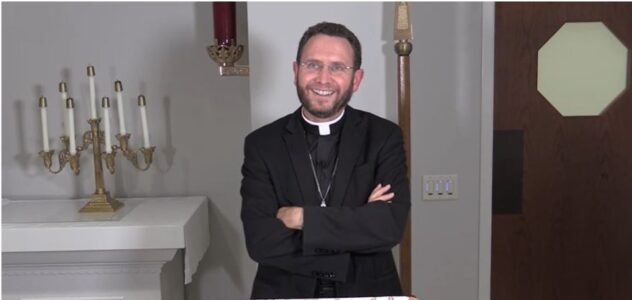




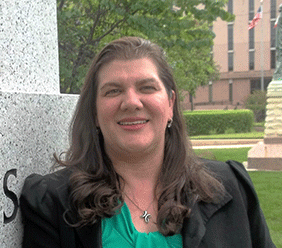
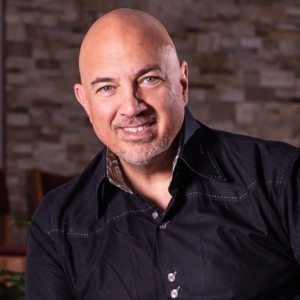
 Kimberly Kay Cox
Kimberly Kay Cox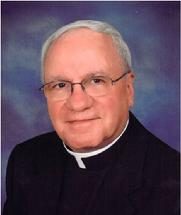







 Mark Mogilka
Mark Mogilka




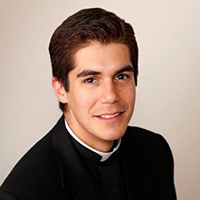
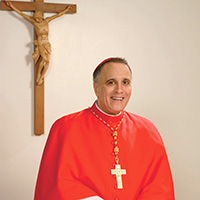








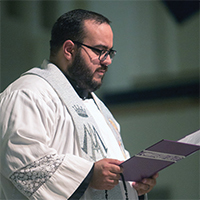
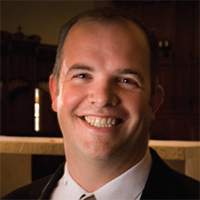


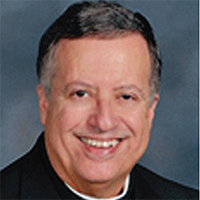

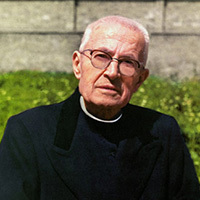







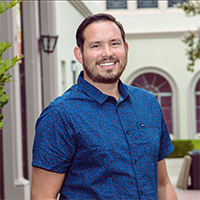
 Armando Cervantes
Armando Cervantes Anna Betancourt
Anna Betancourt
 Andrea Chavez-Kopp
Andrea Chavez-Kopp